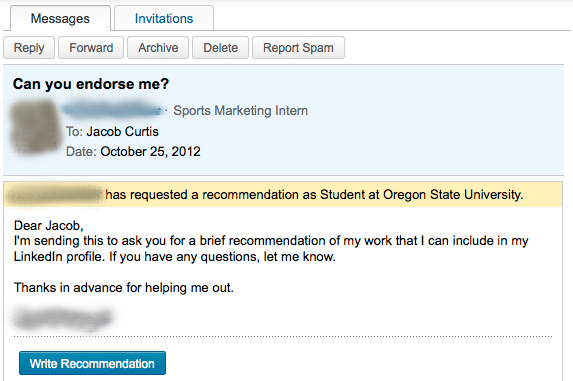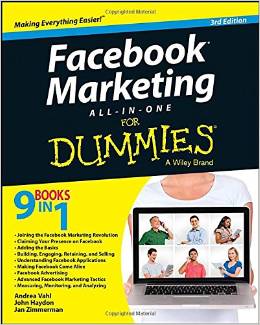by Jacob Curtis
 Have you ever been asked for a recommendation on Likedin? I have, and I don’t think my response was what they were expecting.
Have you ever been asked for a recommendation on Likedin? I have, and I don’t think my response was what they were expecting.
It started off like this:
“Unfortunately I don’t feel like I know you well enough to write you a recommendation.”
Now before you write me off as “rude” I’d like to not only justify my answer but also offer some insight as to why I responded the way I did.
You see, ever since I graduated from Oregon State, I’ve become the go-to-guy my advisors send prospective students to who are looking for a career in Social Media Marketing – I am one of the few students who have actually applied their degree in a relevant industry.
The initial conversations with this particular student weren’t anything out of the ordinary. We talked about personal branding; building your resume, and hot to keep your social profiles clean over the course of two hour long phone calls.
We then connected on Linkedin, which was fine, and then it happened… imagine my surprise when I found this in my inbox shortly after our conversations:
Which leads me to my first Don’t:
Don’t send a generic default message when asking for a recommendation.
Do send your request with pertinent information or guide them in the right direction about what “work” you are asking to be recommended for. Bring up specific jobs or projects you worked with that person on. This will also make your request more personable.
Don’t just ask anyone for a recommendation.
Do ask for recommendations from coworkers, clients, or those who have directly managed you. Good recommendations are important, not generic ones like “so and so is a hard worker”. Potential employers will see right through that which is why real recommendations are built on professional relationships that have been built over time.
Don’t jump the gun.
Do give your coworkers, clients, or managers time to develop a professional relationship with you.
Think of it this way:
“Recommendations are like fine wine, the longer you wait the better they become.”
Meaning you give that advisor or employer more time to have legitimate examples of your experience, in return you receive a better recommendation.
Don’t underestimate recommendations.
Do remember when someone recommends you they are putting their own reputation on the line. For that reason, wait until you are sure they can speak highly about your proven abilities and how those abilities will transfer through to your next employer.
Don’t wait.
Do capitalize on asking for a recommendation when your work is still fresh in their mind. Unless you were an extremely outstanding employee, don’t expect your manager to remember all the good deeds you’ve done if it’s been 3 years since you’ve worked for them. Though there is no definitive “right time” to ask, there is definitely a wrong time as described above.
In closing, I went over these same guidelines with the prospective student and they took my feedback very well. After all we both agreed it was an honest mistake and a great learning opportunity for both of us – I don’t usually provide such constructive criticism.
I want to thank this student for the inspiration to write this blog and commend them on being pro-active; at least they took the step to ask for a recommendation even if it was misguided. Remember a closed mouth does not eat, if you never ask for a recommendation it’s very likely you won’t ever receive one.
Have you ever denied someone a recommendation? Have you ever been denied one? Do you agree with my Do’s and Don’ts? Let me know in the comments below.
| Jacob Curtis, New Media Manager living in Portland Oregon. Jacob produces weekly social media tutorials , videos, comics, blogs, and much more. Follow Jacob on Twitter or Google Plus. |
























Your response, while correct, did come off as rude. Maybe a better way would have been something like… “I enjoyed our conversation on the phone recently, however I would need the opportunity to know you and your work better before I could give an accurate and honest recommendation.”
Also, I’ve turned down recommendations as well as friend requests. I just don’t respond to those I don’t know well. I think most people in this modern day of “I’ve got 2,749 friends” people just don’t even notice if you ignore their request. Although, in your story, this student might have been really looking forward to a recommendation from you and would have noticed if you hadn’t responded. So, in summation, it seems that I wouldn’t know what the right thing would be to do in any situation. Ever.
Great tips here Jacob. I completely agree about taking the time to fill out the message and not send the generic one.
Glad you took the time to go over all of these steps with that student. They obviously needed some guidance. Good man. 🙂
Hey Sandra, thanks for the feedback, and I appreciate your honesty in how you think my response came off. I agree, a much more professional tone may be warranted in most situations, but I was addressing her on a student-to-student level (since I was in her shoes just 3 years ago)
I wanted to be extra critical in my response to her in order to reinforce a lesson that was better learned through me, than someone more important to her future progression later. So I didn’t sugar coat it.
She took the feedback very well, and I followed my response with the same teachings I provided in this post. It was a good learning experience for both of us.
I wouldn’t compare Professional Recommendations on Linkedin to friend requests as they say a lot more than any amount of friends could.
BUT if you don’t know the person well enough in any case, than it’s perfectly acceptable not to respond. It’s a fine line to walk.
This is why the post is called How NOT to ask for a Linkedin Recommendation.
Thanks DJ! You know my Bark is worse than my Bite anyway. I am thankful to even be approached for guidance and I have no doubt this student is on the right path to a successful career after graduation with the lessons learned in this situation. Tough-love right!?
Wow. I’m actually surprised people don’t already know this. Then again, I guess I’m not. Oh, and I don’t think you need to apologize for being “rude.” I think the student learned a very valuable lesson while the stakes are low. Cheers, buddy!
Exactly! “The stakes are low” was the term I was looking for. Generic messages I’m use to not recommendation request so soon after initial contact. Thanks for stopping by and leaving your feedback James!
Thanks again @jacobcurtis:disqus for your post! It definitely inspired some great discussion!
I refused one recommendation…it was my husband’s friend who I barely knew and had not done business with in any way. I pretty much said what you did and he tried to pass it off as a “typo” in the to box. Yeah, right. I don’t think there was anything wrong with how you responded at all.
Good information for those who do not understand how a recommendation should work. I find I like to do recommendations for people before they ask for them. If I know them extremely well I just do it. If I feel they would appreciate being asked first I do that. I like to send them the recommendation first to approve it either way.
That’s very nice of you Marlene and a great way to go about it. I imagine there must be something that triggers you to write a recommendation? When do you know it’s the right time to write them one?
Those you write your recommendations for must feel very appreciated when they see your unsolicited recommendation in their inbox.
Thanks for leaving your 0.02!
Bad recovery on his part and another great example of how NOT to ask for a Linkedin recommendation. I’m glad you agree with my response!
You got it @andreavahl:disqus !
Well said, Jacob! I’m going to keep the link to this post handy to refer to strangers and aquaintences who request referrals and recommendations based on casual conversations! Thanks!
Thanks Jim! Glad this can be the resource I was hoping it would be. I know I’m not the only one who is being asked for these recommendations.
Great post Jacob. I have in fact had to deny several people who have asked me for recommendations. These people attended classes that I taught. I am not quite sure why they requested a recommendation from me as they also used the default LinkedIn recommendation message. They had never worked with me or done any work for me, so as you can imagine I was surprised to receive recommendation requests from them.
Glad you can relate to my experience @google-9fc17a7c7435c2a504df014ab7747d80:disqus I’m glad I’m not the only one who has gone through this!
Very well written Jacob. I have felt the same about several points you’ve noted here. I don’t mind endorsing any of my friends – for the things I know they’ve done or are familiar with. Also, in the same token, I would not ask (and have not asked) anyone to endorse me or any of my skills. However, since reading this, I believe I will since it is deemed to a very important key for LinkedIn – in the correct fashion, though. Thank you too, for the refresher on not asking for anything they have not seen me do – I feel it would just hit that person in the gut – not to mention, making them feel as if they were being dishonest. Your blog hits directly on point! Thank you.
So glad you got some good takeaways from my post @72c7ad1f4ed46a51621d90efd2635b78:disqus . Remember there is a difference between Linkedin’s new “Endorsements” and “Recommendations” which are much more involved.
Not only will it make them feel as if they were being dishonest – but this also puts their reputation on the line as the one who is recommending you.
The work doesn’t stop after you receive a recommendation. From there you must continue to work hard to justify it.
Thanks for the response!
Good info Jacob. Sometimes it seems that people confuse Linkedin with Facebook; the more connections the better. I am astonished at times when people, folks I’ve had no interaction with, want to Connect, Endorse, or Recommend me. I have learned to question more closely the reasoning for Connect requests and I’m working to keep the info on my Linkedin page real and verifiable.
Exactly Doug, real people connect with real people. simple enough!
Jacob, I really enjoyed your article on how not to ask for a recommendation. I totally agree with you on these points. One of the reasons they carry so much weight is that the person is taking the time so sit down and write something about you. That’s opposed to those totally useless “endorsement” that LI now offers. The value I place in the recommendations in powerful because they are not always easy to get so that when you get one, it’s worth gold. I would add that another method that has been successful for me in getting someone to write a recommendation is to actually take the time to write one for them first. They feel a bit obligated to reciprocate. That seems to be a productive and effective manner to go about it as well. Thanks for sharing this information Jacob.
I feel the same way about a good recommendation being gold.
On your idea of sending them a recommendation first, I feel unique recommendations that aren’t simply reciprocated hold even more weight. I actually try to stay away from “traded” recommendations.
Thanks for stopping by!